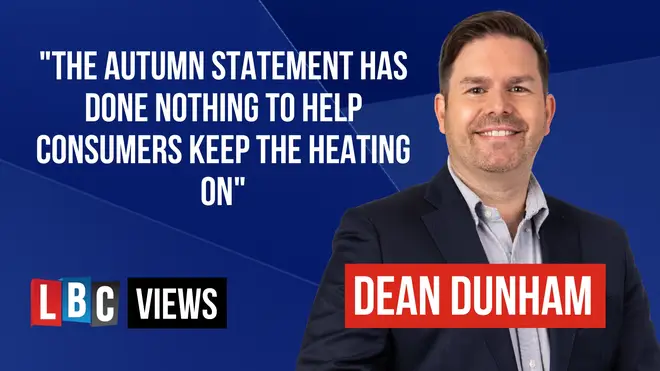
Nick Abbot 10pm - 1am
18 November 2022, 08:54 | Updated: 20 November 2023, 13:38

The Autumn statement has done nothing to help consumers keep the heating on as the energy crisis deepens at the hands of suppliers
Jeremy Hunt announced the largest tax rises in a generation this week causing more misery for millions of Brits already struggling with the cost of living crisis.
It was obvious that we would see tax rises but I had hoped the chancellor would address spiralling energy prices and provide some real help for households struggling to keep the heating on, but this was wishful thinking. Instead, the Energy Price Guarantee has been made less generous causing the Chancellor to announce energy bills will rocket by £500 to an average £3,000 a year from April 2023- nearly £2,000 higher than they were in 2021.
However, this is not the only bad news for households, as it has emerged that there has been a surge in energy firms switching consumers to ‘prepay’ meters (especially those with smart meters where the switch can take place remotely), causing many to end up without heat and power.
Why is this happening?
As a form of credit control energy suppliers are now routinely moving households onto prepay if they have built up a debt on their account, leaving them in a position where they have to pay in advance for energy.
The problem
Prepay is said to be circa £70 a year more expensive than direct debit (on typical dual-fuel use) and it means you have to pay upfront for your energy. For many, this has meant having no energy supply as they have been cut off due to running out of credit.
Can you refuse a prepay meter?
If you have fallen behind with your energy bills unfortunately not, as in these circumstances energy providers can switch you to a prepay meter without your consent.
However, before switching you to prepay your supplier will have to satisfy itself that it is "safe, practical and easy for you to use and get to the meter". The exact same rules apply whether your supplier is physically installing a new prepay meter in your home or switching your existing smart meter into prepay mode. This means your supplier will have to consider:
How will I know I’m being switched to prepay?
If your supplier wants to switch you to prepay it must give you at least seven days clear notice. If you have a smart meter the switch will happen remotely but for those without a smart meter your energy provider would have to physically change the meter at your home.
Urgent advice for any vulnerable
If any of the following applies to you or someone in your household you may be able to join the Priority Services Register by signing up through your energy supplier:
Being subscribed to this service will give you additional protection, as it will alert your supplier to your vulnerable situation and will mean they have to be even more careful when considering whether to put you on to prepay.
Advice if your falling behind with your energy bills
Don’t ignore the situation as it is likely to end up with you being moved to a prepay meter. Instead, communicate with your supplier and explain your financial situation. Ofgem, the energy regulator, has told energy suppliers they must help consumers where possible, usually by negotiating a payment plan that you can afford. You could also ask for a payment holiday and most supplier also have hardship funds that you can ask to access.